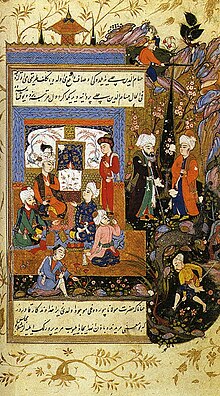Mevlana Xhelaludin Rumi
Xhelaledin Muhamed Rumi (persisht: جلالالدین محمد رومی) ose Xheladin Rumiu, i njohur edhe si Mevlana (persisht: مولانا, "Mjeshtri ynë"[1]), ishte një poet, jurist, dijetar islam, teolog dhe mësues i sufizmit i shekullit XIII. Ka lindur më 30 shtator 1207 në Vahsh të Persisë[1] apo në Belh (në Afganistanin e sotëm) dhe ka vdekur më 17 dhjetor 1273 në Konia (në Turqinë e sotme).


Poezitë e tij janë të shkruara në persisht dhe të përkthyera në shumë gjuhë të botës. Rumi ka jetuar në kohën e selxhukëve dhe ka shkruar, përveç se në persisht, edhe në arabisht, greqisht dhe në turqisht.
Poema Mathnawī, kompozuar në Konia, mund të konsiderohet një nga lavdet letrare më të pastra të gjuhës perse. Veprat e tij janë lexuar gjerësisht në gjuhën e tyre origjinale në gjithë Iranin e Madh dhe në botën persisht-folëse.[2][3] Përkthimet e veprave të tij janë shumë të njohura, sidomos në Turqi, Azerbajxhan, Shtetet e Bashkuara, dhe Azinë Jugore.[2] Poezia e tij ka ndikuar në letërsinë perse, por edhe turke, panxhabe, hindi, urdu si edhe në literaturat e disa gjuhëve indo-ariane përfshirë gjuhët çagatai, pashto, dhe bengali.
Jeta
RedaktoRumi u lind nga prindër persisht-folëse,[4] me origjinë nga Belh (qyteti i Horasanit, sot në Afganistan). Ai u lind ose në Vahsh, një fshat që ndodhet në lumin Vahsh në rajonin më të madh në Belh, që sot njihet si Taxhikistan,[5] ose në qytetin e Belh, që sot njihet si Afganistan.
Galeria
Redakto-
Dishepujt e vënë pranë njëri-tjetrit
-
Jubba Me kodet sekrete të tawiz
-
Një kopje e Mathnawi
-
Prejardhja në formën e Kaligrafisë
-
Tributes për Meulana Rumi - korniza poshtë është një ekstrakt nga një poemë
-
Varr
Referime
Redakto- ^ a b Lohja Q., Edin (2022). Dielli i Dashurisë: Vargje të zgjedhura. Prishtinë: JETA. ISBN 9789951904131.
{{cite book}}: Mungon ose është bosh parametri|language=(Ndihmë!) - ^ a b Annemarie Schimmel, "The Mystery of Numbers",Oxford University Press, Apr 7, 1994. p. 51: "These examples are taken from the Persian mystic Rumi's work, not from Chinese, but they express the yang-yin relationship with perfect lucidity."
- ^ Seyyed Hossein Nasr, "Islamic Art and Spirituality", Suny Press, 1987. p. 115: "Jalal al-Din was born in a major center of Persian culture, Balkh, from Persian speaking parents, and is the product of that Islamic Persian culture which in the 7th/13th century dominated the 'whole of the eastern lands of Islam and to which present day Persians as well as Turks, Afghans, Central Asian Muslims and the Muslims of the Indo-Pakistani subcontinent are heir. It is precisely in this world that the sun of his spiritual legacy has shone most brillianty during the past seven centuries. The father of Jalal al-Din, Muhammad ibn Husayn Khatibi, known as Baha al-Din Walad and entitled Sultan al-'ulama', was an outstanding Sufi in Balkh connected to the spiritual lineage of Najm al-Din Kubra."
- ^ Annemarie Schimmel, The Triumphal Sun: A Study of the Works of Jalaloddin Rumi, SUNY Press, 1993, p. 193: "Rumi's mother tongue was Persian, but he had learned during his stay in Konya, enough Turkish and Greek to use it, now and then, in his verse".
- ^ Franklin Lewis: "On the question of Rumi's multilingualism (pages 315–17), we may still say that he spoke and wrote in Persian as a native language, wrote and conversed in Arabic as a learned "foreign" language and could at least get by at the market in Turkish and Greek (although some wildly extravagant claims have been made about his command of Attic Greek, or his native tongue being Turkish") (Lewis 2008:xxi). (Franklin Lewis, "Rumi, "Past and Present, East and West: The Life, Teachings and Poetry of Jalal al-Din Rumi", One World Publication Limited, 2008). Franklin also points out that: ”Living among Turks, Rumi also picked up some colloquial Turkish.”(Franklin Lewis, "Rumi, "Past and Present, East and West: The Life, Teachings and Poetry of Jalal al-Din Rumi", One World Publication Limited, 2008, p. 315). He also mentions Rumi composed thirteen lines in Greek (Franklin Lewis, "Rumi, "Past and Present, East and West: The Life, Teachings and Poetry of Jalal al-Din Rumi", One World Publication Limited, 2008, p. 316). On Rumi's son, Sultan Walad, Franklin mentions: “Sultan Valad elsewhere admits that he has little knowledge of Turkish”(Sultan Walad): Franklin Lewis, "Rumi, "Past and Present, East and West: The Life, Teachings and Poetry of Jalal al-Din Rumi", One World Publication Limited, 2008, p. 239) and “Sultan Valad did not feel confident about his command of Turkish”(Franklin Lewis, Rumi Past and Present, East and West, Oneworld Publications, 2000, p. 240)